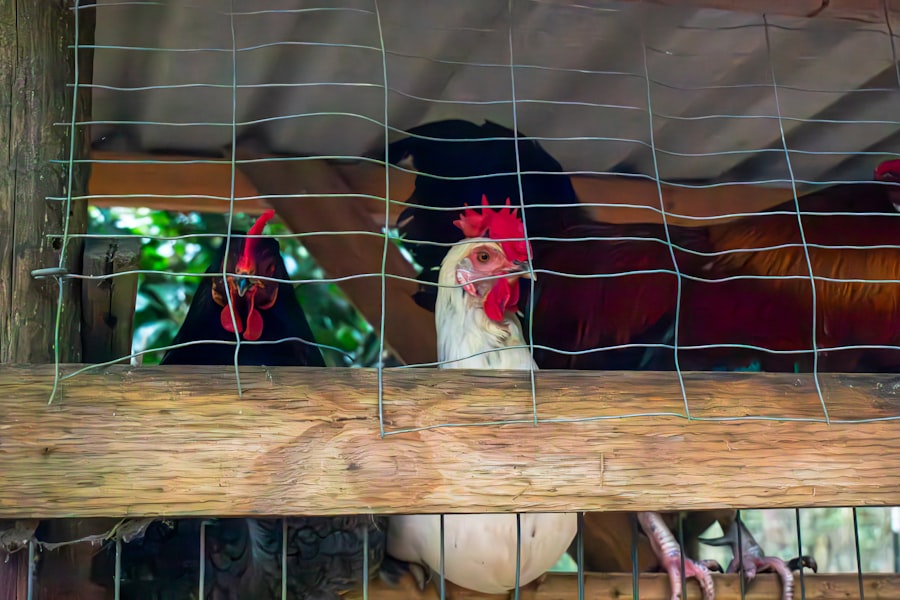Chickens are naturally curious and inquisitive animals, attracted to gardens and yards due to the abundance of insects, plants, and other potential food sources. They are known to scratch and peck at the ground, which can damage plants and flower beds. Understanding chicken behavior is crucial for finding effective ways to keep them out of gardens.
As social animals, chickens tend to follow the lead of the dominant hen in their flock. If one chicken discovers a way into a garden, the rest of the flock is likely to follow. Chickens are also creatures of habit and will continue to return to a food source they have found rewarding in the past.
Chickens are easily startled by sudden movements or loud noises, which can be used as a deterrent. By understanding their natural instincts and behaviors, gardeners can implement effective strategies to prevent chickens from entering and damaging their gardens.
Table of Contents
- 1 Creating Physical Barriers
- 2 Using Natural Deterrents
- 3 Implementing Repellent Scents
- 4 Providing Alternative Attractions
- 5 Maintaining a Clean and Tidy Garden
- 6 Seeking Professional Help
- 7 FAQs
- 7.1 What are some natural ways to keep chickens away from hostas?
- 7.2 Are there any commercial products available to keep chickens away from hostas?
- 7.3 Can I train my chickens to stay away from my hostas?
- 7.4 Are there any plants that chickens are naturally deterred by?
- 7.5 What are some other tips for protecting hostas from chickens?
Key Takeaways
- Chickens are naturally curious and will explore their surroundings, including gardens, for food and entertainment.
- Physical barriers such as fences and netting can effectively keep chickens out of specific areas of the garden.
- Natural deterrents like predator decoys, motion-activated sprinklers, and reflective objects can discourage chickens from entering the garden.
- Repellent scents such as citrus, garlic, and vinegar can be used to deter chickens from entering the garden.
- Providing alternative attractions like designated foraging areas and dust baths can redirect chickens’ attention away from the garden.
- Regularly cleaning up fallen fruits, seeds, and other food sources can help discourage chickens from frequenting the garden.
- If chicken infestation persists, seeking professional help from pest control or animal control services may be necessary.
Creating Physical Barriers
One of the most effective ways to keep chickens out of your garden is by creating physical barriers that prevent them from gaining access. This can be done by installing fencing around the perimeter of your garden or using chicken wire to cover vulnerable areas. It’s important to ensure that the fencing is tall enough to prevent chickens from flying over it, as they are capable of short bursts of flight.
Additionally, burying the bottom of the fence underground can prevent chickens from digging underneath it to gain access. Another option is to use hardware cloth or mesh netting to cover individual plants or flower beds that are particularly vulnerable to chicken damage. This can be an effective way to protect your garden while still allowing for airflow and sunlight to reach your plants.
Creating physical barriers not only prevents chickens from entering your garden but also serves as a visual deterrent, signaling to the chickens that they are not welcome in that area. By implementing physical barriers, you can effectively protect your garden from chicken damage and create a safe and secure space for your plants to thrive.
Using Natural Deterrents

In addition to physical barriers, there are also natural deterrents that can be used to keep chickens out of your garden. One effective method is to use predator decoys, such as fake owls or hawks, which can create the illusion of danger and scare off chickens. Another natural deterrent is the use of reflective surfaces, such as old CDs or aluminum foil, which can create flashes of light that startle and deter chickens from entering your garden.
Additionally, planting strong-smelling herbs and flowers, such as lavender, mint, or marigolds, can help repel chickens due to their strong scent. Using natural deterrents is a non-invasive way to keep chickens out of your garden while also adding visual interest and diversity to your outdoor space. By incorporating natural deterrents into your garden, you can create an environment that is unappealing to chickens while still maintaining a beautiful and functional outdoor space.
Implementing Repellent Scents
Another effective way to keep chickens out of your garden is by implementing repellent scents that are unappealing to them. Chickens have a strong sense of smell and are sensitive to certain odors, which can be used to your advantage when trying to deter them from entering your garden. One common method is to use citrus peels or essential oils, such as lemon or orange, which are known to be unappealing to chickens.
Simply scatter citrus peels around your garden or mix a few drops of essential oil with water and spray it on vulnerable plants to create a barrier that chickens will want to avoid. Another option is to use vinegar or garlic, both of which have strong odors that can repel chickens. By mixing vinegar or garlic with water and spraying it on plants or around the perimeter of your garden, you can create a scent barrier that deters chickens from entering.
Implementing repellent scents is a natural and non-toxic way to keep chickens out of your garden while also adding a pleasant aroma to your outdoor space.
Providing Alternative Attractions
One way to keep chickens out of your garden is by providing alternative attractions that will draw their attention away from your plants and flowers. This can be done by creating a designated area for chickens to forage and scratch, such as a separate patch of land or a raised bed filled with sand or dirt. By providing a space for chickens to engage in natural behaviors, you can redirect their attention away from your garden and minimize the damage they may cause.
Another option is to provide alternative food sources for chickens, such as a feeder filled with grains or seeds. By ensuring that chickens have access to food sources outside of your garden, you can reduce their motivation to enter and forage in your outdoor space. Providing alternative attractions not only keeps chickens out of your garden but also promotes their natural behaviors and ensures their well-being.
Maintaining a Clean and Tidy Garden

Keeping your garden clean and tidy is essential in deterring chickens from entering and causing damage. Chickens are attracted to areas with loose soil and debris, as they provide opportunities for scratching and foraging. By regularly raking and tidying up your garden, you can remove potential food sources and make the area less appealing to chickens.
Additionally, keeping your plants well-maintained and free from overgrowth can make it more difficult for chickens to access them and cause damage. Another important aspect of maintaining a clean and tidy garden is proper waste management. Ensuring that compost bins are securely covered and that food scraps are properly disposed of can help prevent attracting chickens to your outdoor space.
By maintaining a clean and tidy garden, you can create an environment that is less appealing to chickens and reduce the likelihood of them causing damage to your plants and flowers.
Seeking Professional Help
If you have tried various methods to keep chickens out of your garden without success, it may be time to seek professional help. A local animal control agency or pest management professional may be able to provide additional guidance and assistance in deterring chickens from entering your outdoor space. They may have access to specialized equipment or knowledge on effective deterrent methods that can help address the specific challenges you are facing.
Additionally, seeking professional help can also provide insight into local regulations and ordinances regarding the keeping of chickens in residential areas. In some cases, there may be legal avenues available for addressing issues related to nuisance animals on private property. By seeking professional help, you can gain access to resources and expertise that can help effectively address the presence of chickens in your garden.
In conclusion, understanding the behavior of chickens is crucial in finding effective ways to keep them out of your garden. Creating physical barriers, using natural deterrents, implementing repellent scents, providing alternative attractions, maintaining a clean and tidy garden, and seeking professional help are all strategies that can be used individually or in combination to effectively deter chickens from entering your outdoor space. By implementing these strategies, you can protect your plants and flowers while creating a safe and secure environment for both your garden and the chickens themselves.
If you’re looking for more tips on keeping chickens, you might be interested in this article on turning a shed into a chicken coop. It offers valuable insights on how to repurpose existing structures to create a comfortable and functional space for your feathered friends.
FAQs
What are some natural ways to keep chickens away from hostas?
Some natural ways to keep chickens away from hostas include using physical barriers such as chicken wire or fencing, planting strong-smelling herbs or flowers around the hostas, and using natural repellents such as citrus peels or vinegar.
Are there any commercial products available to keep chickens away from hostas?
Yes, there are commercial products available such as chicken repellent sprays or granules that can be used to deter chickens from eating or damaging hostas.
Can I train my chickens to stay away from my hostas?
Yes, you can train your chickens to stay away from your hostas by using positive reinforcement techniques such as rewarding them with treats when they stay away from the plants, and using negative reinforcement techniques such as making loud noises or using a water sprayer when they approach the hostas.
Are there any plants that chickens are naturally deterred by?
Yes, there are certain plants that chickens are naturally deterred by, such as strong-smelling herbs like lavender, mint, and rosemary, as well as plants with prickly or thorny leaves such as holly or barberry.
What are some other tips for protecting hostas from chickens?
Some other tips for protecting hostas from chickens include creating designated areas for the chickens to forage and providing them with plenty of alternative food sources, keeping the chickens well-fed and entertained to reduce their interest in the hostas, and regularly inspecting the garden for any signs of chicken damage.
Meet Walter, the feathered-friend fanatic of Florida! Nestled in the sunshine state, Walter struts through life with his feathered companions, clucking his way to happiness. With a coop that’s fancier than a five-star hotel, he’s the Don Juan of the chicken world. When he’s not teaching his hens to do the cha-cha, you’ll find him in a heated debate with his prized rooster, Sir Clucks-a-Lot. Walter’s poultry passion is no yolk; he’s the sunny-side-up guy you never knew you needed in your flock of friends!







